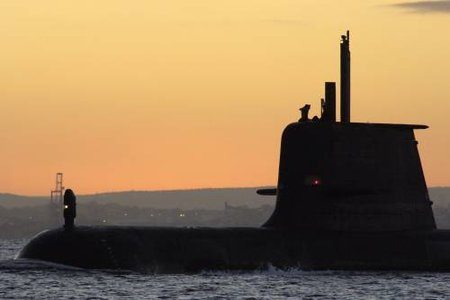Japan’s defense minister urged Australia Sunday to award a huge submarine contract to his country, saying such a deal would help bolster regional security.
Australia has put out to tender a project worth up to Aus $50 billion (US $36 billion) to replace its current diesel and electric-powered Collins Class submarines.
France and Germany are also in the running with Japan to secure the order, with a Nov. 30 deadline to submit final proposals.
Defense Minister Gen Nakatani said picking Tokyo could help ensure maritime security in the Asia-Pacific, alluding to the importance of regional allies such as the US, Japan and Australia working together in the face of China’s growing military might.
He said after talks with his counterpart Marise Payne in Sydney that awarding Japan the contract would be of “strategic importance, significant strategic importance, and this is not just about transfer of defense equipment and capabilities.”
“This will lead to operational cooperation between Japan and Australia… Japan and Australia and the US.”
Nakatani added that if Japan were chosen, it would be a “model for strategic cooperation between Australia, US and Japan.”
For Australia, cooperating with Japan — whose Soryu is widely seen as the best submarine of its type — risks angering its biggest trading partner China.
Payne said Japan was “a key defense partner” with “similar values, shared strategic interests.”
“We have a common alliance with the US and a significant proportion of our discussions today was devoted to talking about enhancing that defense cooperation, with growing engagement between the Australian Defence Force and the Japan self-defense forces,” she added.
But she said this was separate to the tender process, which she did not want to preempt.
Besides matching the range and endurance of the Collins Class, the new generation of subs are expected to offer superior sensor performance and stealth capabilities.
The tender process has been politically sensitive, with Canberra keen to maximize Australian industry involvement and jobs. There are fears that any off-the-shelf purchase could kill off the domestic shipbuilding industry.
French naval contractor DCNS told a parliamentary inquiry in July that it would be able to carry out more than 70 percent of construction in Australia.
John White, the Australian head of Germany’s TKMS, which is also in the running to win the contract, has said his defense firm could also build all the submarines locally with some imported parts.
Nakatani said Japan would try to maximize the participation of Australian companies.










